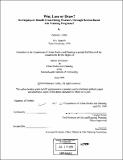Win, loose or draw? : do employers benefit from hiring workers through Boston-based job training programs ?/
Author(s)
Libby, Patricia J. (Patricia Jane), 1957-
DownloadFull printable version (3.050Mb)
Alternative title
Do employers benefit from hiring workers through Boston-based job training programs?
Other Contributors
Massachusetts Institute of Technology. Dept. of Urban Studies and Planning.
Advisor
Langley Keyes.
Terms of use
Metadata
Show full item recordAbstract
In the movement to "change welfare as we know it," traditional job training programs in Massachusetts have inadvertently come under siege. State law-makers are eschewing job training in favor of work-first policies -- mandating most public assistance recipients work or volunteer a minimum of twenty hours per week in exchange for benefits. Job training must be done as additional time permits and within the confines of a well-documented shortage of daycare subsidy slots (eliminating training options for all but the most resourceful welfare mothers). But will welfare recipients find success in getting and keeping a job without support from job training programs? Boston's most prominent nonprofit training providers have been supplying local employers with a steady source of workers for well over a decade. One assumes firms hire training program graduates because they are good workers yet, how can we be sure? This study, which focuses on Boston's largest employment sector -- the health care industry -- illustrates that firms do derive substantial benefits when hiring workers from local job training programs. These benefits include workers that are well trained, highly motivated, bring special skills to the workplace, and are cost-effective to hire. While every employer surveyed did not claim each one of these benefits, all perceived tangible advantages to working with Boston based training programs and valued their relationship with them. It is worth noting that job training programs engage a more diverse clientele than the universe of welfare recipients (recipients comprise roughly 30-50% of trainees). However, since the training population is exclusively low-income, lessons can be extrapolated as to the effectiveness of training programs with the larger public assistance population.
Description
Thesis (S.M.)--Massachusetts Institute of Technology, Dept. of Urban Studies and Planning, 1999. Includes bibliographical references (leaves 57-60).
Date issued
1999Department
Massachusetts Institute of Technology. Department of Urban Studies and PlanningPublisher
Massachusetts Institute of Technology
Keywords
Urban Studies and Planning.